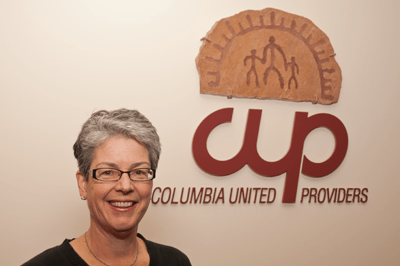Editor’s Note: The state Health Care Authority was scheduled to finalize contracts with selected Medicaid insurance providers on February 29. At press time, Columbia United Providers was not included in that group.
From insurance broker to medical care provider, from employee to patient, Clark County residents are concerned about the economic and social impact of the state’s Health Care Authority (HCA) failing to name Vancouver-based Columbia United Providers (CUP) to the state’s new Medicaid managed care contract.
“HCA and the state may save money,” said Greg Seifert, president and CEO of Biggs Insurance, “but the other consequences are serious.”
According to CUP CEO Ann Wheelock, CUP has established an extensive network of care providers, working closely with them to offer a high level of care at an affordable cost. However, that all may come to an end this summer – catapulting CUP’s 80 employees into the unemployed sector, and potentially leaving about 47,000 Medicaid patients without enough care providers to serve them.
The loss of 80 jobs is just the tip of the economic iceberg, according to an economic impact memorandum prepared for CUP by local economic and development consulting firm E.D. Hovee & Co. LLC. The memorandum estimates that these 80 jobs represent a direct loss of $6.1 million in payroll, benefits and payroll-related taxes.
Beyond that, said the memorandum, the loss of CUP equates to an estimated annual business output loss of $18 million per year, as well as reduced tax payments to state and local agencies, including $300,000 per year in sales taxes – 20 percent of which would be a direct loss to local cities, the county and C-TRAN.
For example, Wheelock said the loss of CUP, which prints “large amounts” of member materials, would have a “significant impact” on the local printing company that CUP uses. As another example, she said, the owner of the building CUP occupies would find his building joining the other numerous vacant commercial buildings in the county, and may not have an easy time finding a new tenant.
The Hovee report also estimated that the loss of CUP’s 80 jobs could affect 40 additional jobs throughout the county. For example, Wheelock explained that CUP reimburses care providers at a rate that is higher than the standard Medicaid rate of $22 per “unit of service.” Care providers that continue to participate with the new plans will therefore be receiving less reimbursement.
“Providers will have to lay off staff, and cut back in other areas,” said Wheelock, if they continue to see Medicaid patients – which some may not, deeming it economically infeasible.
Dave Bennett, CEO of Rebound Orthopedics and Neurosurgery, said “We have to look at payer mix, in order to survive. We feel an obligation to participate with a local carrier [such as CUP], but don’t feel the same way about large out-of-state carriers.”
Echoing his concerns, Sarah Kohlenberger, a licensed mental health counselor in Battle Ground who works with troubled children, said “CUP pays only 60 percent of the commercial reimbursement rate. I’ve adjusted my practice, because I think it is so important to get these kids healed. But it sounds like payments are going to be even lower, and I can’t afford to lose my practice.”
Both Bennett and Kohlenberger reported that the newly named out-of-state Medicaid carriers had not yet contacted them about signing up – an omission Bennett called “strange.”
“You’d think they’d be doing so, considering they have to be up and running July 1,” said Bennett.
A regional study revealed that Clark County is short at least 29 primary care physicians for its 405,000 residents. Wheelock said that about 1,000 Clark County physicians are associated with the Keiser plan, and do not see Medicaid patients.
“We already have a limited network,” said Kohlenberger. “It’s already stretched so thin – if it gets even smaller, then what?”
Hospitals, too, may feel a negative economic impact from the loss of CUP. Steve Sutherland, M.D., a knee/hip surgeon and president of Rebound, said that CUP has been “very effective” at keeping patients out of the emergency room. If these patients no longer have primary care, Sutherland said they will seek care at hospital ERs, which are mandated to treat everyone who walks in the door.
“Hospitals are already operating on extraordinarily low margins,” said Sutherland. “Even a one-percent increase in Medicaid patients could mean the difference between success and failure.”
Seifert sees the economic effect spreading even further. He said that lower Medicaid reimbursement rates would cause an even greater cost shift to private-pay insurance. If commercial insurance premiums rise, Seifert said more small businesses will modify or drop health coverage, or will pass on the premium hikes to employees. He said that of an average annual wage of $35,000, 17 percent already goes toward health insurance premiums. Wheelock said that CUP had preliminary plans to begin offering coverage to local small employers and the self-employed – plans that will come to nothing if CUP loses its contract with the state.
Sutherland summarized the situation by saying, “Throwing CUP out is not a good answer.”
Bennett was a little more blunt.
“It’s hard to see what the state is doing or thinking,” he said. “They are setting themselves up for a major crisis in Clark County.”
If the HCA’s decision is not reversed soon, Wheelock said CUP will be filing legal action with Clark County Superior Court.




